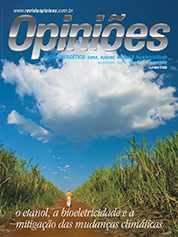Pedro Luiz Fernandes
President of Novozymes Latin America
Op-AA-22
There is no more time for discussions
Ever since the Industrial Revolution expanded throughout the world, beginning in the 19th century, we have not stopped producing increasingly more, and, up to a given point in time, we even believed natural resources would never become rare, and that oil, until then abundant, was infinite. In response to this mistaken way of thinking, we now have climate change increasingly closer to us.
Our country, always viewed as blessed by God, has been faced with climate events that we never before experienced. Climate change must be handled as an enormous risk to our economy, not to mention the social damage it has brought about. In light of these facts, many countries have begun to think about the future development of their economies with low levels of carbon emissions, and, for the most part, started paying attention to renewable energy sources.
Brazil is no exception, since the country is now looking at other sources of renewable energy, to foster its long-term economic development and secure its national energy matrix, in the belief that these sources may contribute to mitigating the devastating effects of evident climate change. Although many initiatives were undertaken to mitigate these effects, one should not forget that the world population’s growth is continuous and expected to reach 9 billion by 2050.
The choices made over the next five years, in terms of renewable energy, will have a far-reaching impact, in the next few decades, on humanity’s survival. Actions taken from now on will have to be undertaken jointly, since they will accomplish very little if undertaken individually as is the case nowadays. Nations must congregate around a common objective, in joint efforts, to achieve results. It is when we rethink tomorrow that alternatives for the energy of the future arise.
Brazil is unquestionably the world leader in the production and consumption of biofuel from renewable sources, using not only existing technologies, but also developing new ones. The best example is the use of sugarcane in the production of biofuel, which increasingly will become more important due to the world demand for non-fossil fuel, and the production of second generation biofuel, the one produced from sugarcane bagasse, will be an excellent option.
This will be a distinguishing factor for Brazil as a future exporter. Apart from second generation ethanol, from bagasse one can also produce energy convertible to bioelectricity, given that like fuel, the world is increasingly in demand of electricity. Biofuel is being rated as a pollutant just as fossil fuel is. For equivocal assessments such as this, fossil fuel, biofuel and bioelectricity must be assessed and measured by the same parameter. Otherwise, this will amount to playing tug-of-war.
The indirect use of land for agriculture is another theme that comes up when talking about biofuel – after all, does the earth exist to produce food or biofuel? The answer is simple: both alternatives are correct. An excellent initiative of the federal government was the recent launching of the agro-ecological sugarcane zoning (“ZAE”), although it will need some improvement.
“ZAE” prohibits expanding sugarcane plantations to the Pantanal region, Amazonia, and the Upper Paraguay River Basin. In that way, it will become evident that sugarcane plantations do not endanger the production of food, notwithstanding the fact that this debate in ongoing in Brazil. There is much abandoned land – in Brazil and in the world. Studies show that if this land were mapped, one would have enough land for the production of food and biofuel.
However, this mapping must be a part of the set of initiatives undertaken by the government, along with the stakeholders’ participation in this subject matter, which must make sure that such initiatives are feasible. There is no more time for debating. What needs to be done now is to think about what to do so that future generations do not suffer adverse impacts resulting from equivocal decisions made until the present time and hope that our actions, from now on, will be sustainable.
May the Conference of the Parties (COP 15) of the United Nations Framework Convention on Climate Change (UNFCC), to be held in Copenhagen, Denmark, next December, be not only another Kyoto Protocol, with another 12 years going by without much being accomplished. I also hope that the more industrialized countries will debate the matter and find a way to transfer their technologies to the developing countries.




